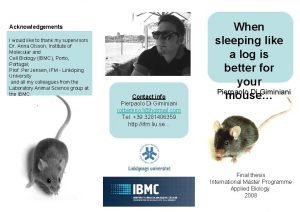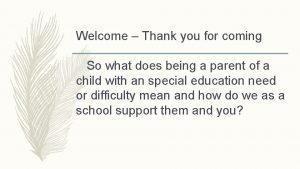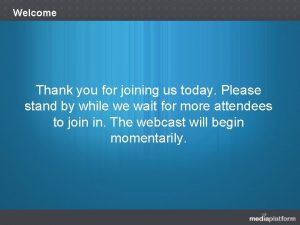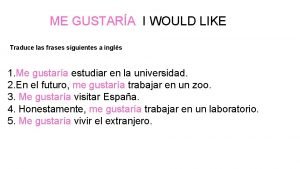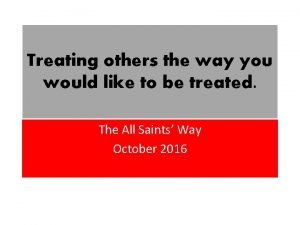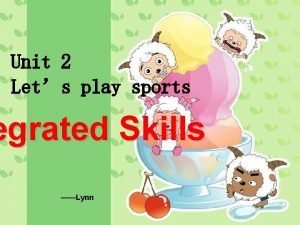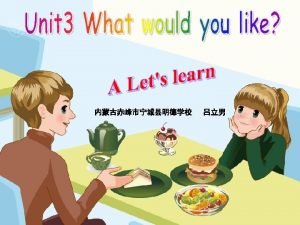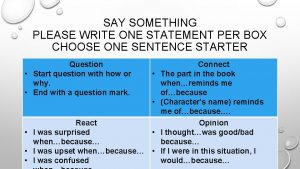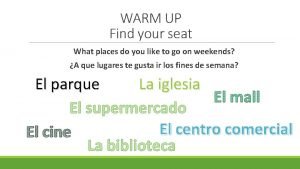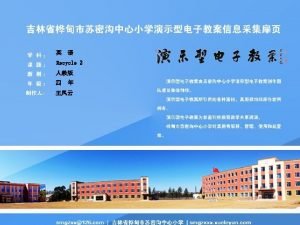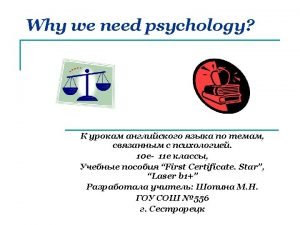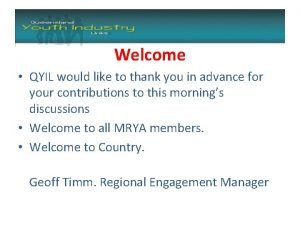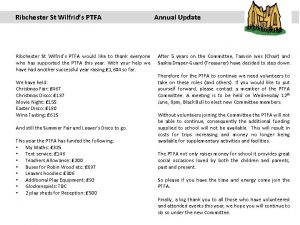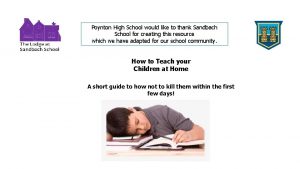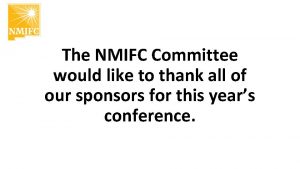Welcome We would like to thank We are


























- Slides: 26

Welcome We would like to thank: We are Family group Jay – Marie Louise – Nicola Alasdair Smith Jane Tilton

Scott Casson-Rennie • Same sex couple – 1 st in Local authority to adopt • Adoptive parent to 3 boys: 9, 16 & 17 years old • Foster Carer • Senior Regional Manager – Adoption UK • Df. E ASUG – Member • Trustee – New Family Social • Advocate – vulnerable children and their families • Volunteer – that list is endless!


Twitterati…. . Tonight’s hashtag #WAFschools Gareth Marr Scott Casson-Rennie We are Family @Gareth. Marr @Gay. Adoption. Dad @wearefamilyadop

Adopted Children – Support from the Virtual School Tonight’s discussion points: • Why children need support at school • How parents and carers need help with picking a school and managing the relationship with school • How this will help schools and teachers

Attachment theory in a nutshell - Robin Balbernie www. vimeo. com/88337039

The Triune Brain – Paul Mac. Lean The rational brain Problem solving, creativity, reasoning, self-awareness, empathy The limbic system The emotional brain ( mammalian brain) Fear, rage, care, anxiety, playfulness Cerebellum The reptilian brain – The instinctive brain Amygdala Hunger, digestion, breathing, posture, Fight – flight - freeze Brain stem

Promoting the education of looked after children Statutory guidance for local authorities July 2014 What are Virtual Schools required to do now?

What changes upon Adoption?

Adopted Children – The reality Trauma, Birth • 0 Age to 7 More lone. In the family abuse Alone attachment • Age 0 to 7 Taking into care transition Birth Trauma, abuse attachment • Age 0 to 7 Moves in care, moves in schools, Birth • Age 0 to 7 Adoption, SGO etc. • Then in Family = heal, build attachment, love. Trauma, abuse attachment Alone

Adopted Children – The reality • Then Education • Age 3 to 4 Pre school, nursery Trauma, abuse attachment Alone Trauma, abuse attachment • Age 5 to 7 Primary KS 1, Transition symptoms appear. School vs parent: Alone Trauma, abuse attachment • Age 7 to 11 KS 2 Transition trauma, symptoms worsen. School sanctions. School vs parent: Alone Trauma, abuse attachment • Age 11 to 16+ Secondary KS 3 transition trauma, puberty, more symptoms. Increased sanctions/exclusions. • School vs parent: Alone

Adopted Parents and Carers – The reality • Adopters experience pre adoption. Infertility, parenting. • YHAC research ‘Adopter Views of Support’ 02/2015. • Pre – adoption good, post AO not so good. • Isolation, depression, don’t want to ask for help.

2014 Survey • 1, 500 adopters parenting 2, 101 children re education • 80% said their child needs more support than their peers. • 59% said their child is always trying to catch up in school and make up for their early life experiences. • 71% said their child's experience of neglect and or abuse in their early life has impacted their ability to cope in school academically. • 75% said it has an impact on their child’s social ability in school.

Adoptive parents and carers – The reality • • BTAO quotes. Pupil Premium Plus misspend. School gates. Walk of shame.

The need for support – the evidence • 2015 Adoption Social survey on ASD • 100 parents and 181 children. • 27% have ASD compared to 1. 1% of the general population. • 49% have been adopted for over 5 years, majority placed before age 5. • 15% of families had ASD diagnosis (more than one child in each family). • 0% placed with an ASD diagnosis. • 70% of families reported other medical/mental health conditions diagnosed post AO.

The need for support – the evidence • Beyond the Adoption Order: challenges, interventions and adoption disruption • Research report • April 2014 • https: //www. gov. uk/government/publications/beyond-the-adoption -order-challenges-intervention-disruption

Beyond the Adoption Order – Predictors of adoption disruption • Child’s age since Adoption Order. Teenagers 10 x more likely. • Age at placement – highest risk + age 4. • Time between adoptive placement and order.

Beyond the Adoption Order – How are Adoptions fairing?

Beyond the Adoption Order – Triggers for challenging behaviour • • Developmental changes. School transitions. Bullying and friendship difficulties. School curriculum. BTAO (Wales) 06/2015 ‘Improve support for adopted children in schools. Teachers need to be better informed about adoption, the risks of bullying and to be more aware of the impact of teaching activities which focus on the family. ’ ‘However, several LA managers simply did not respond to our communication, despite multiple emails and telephone messages. ’

NICE Guidelines – November 2015 ‘Attachment in children and young people who are adopted from care, in care or at high risk of going into care’ • Supporting children with attachment difficulties in schools • ’all staff …. receive appropriate training on attachment difficulties. ’ • ‘Maintains …a personal education plan for children … setting out how they will be supported in school’

Oxford CSE example http: //www. bbc. co. uk/programmes/b 03 vdx 7 t

Benefits – Schools and Teachers Calmer classrooms Raising achievement Partnership with parents Ofsted ratings (now looking at care of vulnerable children) • Enhance reputation of school • Happy schools! • •

Adopted Children – Virtual School support • • School selection and transitions Personal Education Plans Pupil Premium Plus School training


Thank you Tonight’s hashtag #WAFschools Gareth Marr Scott Casson-Rennie We are Family @Gareth. Marr @Gay. Adoption. Dad @wearefamilyadop

Gareth Marr’s Blog: www. lushlife 7. com
 Antigentest åre
Antigentest åre Question form
Question form Would rather form
Would rather form I would like to thank my supervisor
I would like to thank my supervisor Welcome and thank you for joining us
Welcome and thank you for joining us Welcome thank you for coming
Welcome thank you for coming Welcome and thank you for joining us
Welcome and thank you for joining us Welcome welcome this is our christmas story
Welcome welcome this is our christmas story Would sooner
Would sooner Simon woke up early and is very sleepy now. if he
Simon woke up early and is very sleepy now. if he Frases con i would like
Frases con i would like Treat others the way you would like to be
Treat others the way you would like to be I would like to acknowledge the traditional
I would like to acknowledge the traditional Egrated
Egrated Would you like some chicken
Would you like some chicken Would you like some bananas
Would you like some bananas Falica definicion
Falica definicion Would you like to be a journalist
Would you like to be a journalist Chapter 5 bonds bond valuation and interest rates solutions
Chapter 5 bonds bond valuation and interest rates solutions I would like to choose
I would like to choose Would like
Would like I like bananas in french
I like bananas in french What would a satisfactory moral theory be like?
What would a satisfactory moral theory be like? Would you like some soup
Would you like some soup What can you say about these
What can you say about these Parallel structure with paired conjunctions adalah
Parallel structure with paired conjunctions adalah Would you like some
Would you like some



